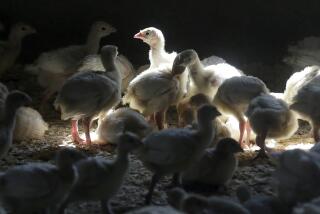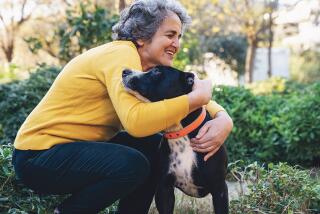A WINGED VICTORY : Vaccines to Shield Pet Birds From 2 Deadly Ailments Hailed by Vets as Preventive-Medicine Breakthrough
- Share via
The first vaccines designed to shield exotic pet birds from two fatal viruses went on the market last week, with county veterinarians hailing them as representing a breakthrough in avian medicine akin to the human polio inoculation.
Until now, there was no immunization for exotic birds, even though the viruses responsible for Pacheco’s disease and Psittacine pox kill thousands of parakeets, parrots, macaws and related species each year, leaving thousands of pet owners heartsick.
Avian veterinarian Larry Nemetz, a bird specialist whose Santa Ana clinic was among the first to use the vaccines this week, described them as “a medical breakthrough in the bird market.”
On Thursday, the first recipient at Nemetz’s clinic was a scarlet macaw named Alfalfa.
The large bird sidled to the far edge of the examining table, but Nemetz was too quick. Deftly, he swaddled the bird in an orange towel, stroked its head and plunged first one hypodermic into a feathered breast, then another.
Alfalfa screeched. But it was over quickly, as Nemetz released the immunized bird to owner Patti Brittain.
“Poor baby,” Brittain cooed. “I’m sorry.”
Actually, Alfalfa was lucky: It was one of the first pet birds in the country to be vaccinated against Pacheco’s and pox.
A New England firm, Maine Biologic Laboratories, has had Department of Agriculture approval since last winter to market the vaccines, but the company--accustomed to developing drugs for chickens and turkeys but not exotic birds--only recently asked a
veterinary business to distribute them.
That firm, California Avian Laboratory, made its initial shipments of vaccine last week. And Nemetz, who runs the Bird In-House Rehabilitation and Diagnostic Clinic in Santa Ana, was among the first to receive it.
Dr. Walter Rosskopf, an avian veterinarian from Fountain Valley, also ordered the vaccines. “We’ve been waiting for his kind of thing for years,” he said.
There have long been immunizations for poultry as well as vaccines for dogs and cats--but none for pet birds, noted Dr. Susan Wells, a zoo veterinarian in New Orleans who is president of the 2,000-member Assn. of Avian Veterinarians.
Until now, she said, manufacturers have not considered the bird market a lucrative one.
2.5 Birds Per Home
But recently that has changed. A 1987 survey by the American Veterinary Medical Assn. estimated that 5 million U.S. households have pet birds, with an average of 2.5 birds in those homes.
Avian vets say those figures vastly understate the count. “A lot of us believe there are 50 million pet birds,” many of them in Southern California, said Dr. Alan M. Fudge, president of California Avian Laboratory.
Fudge and other doctors said the vaccines mark a new era in avian medicine. They could prevent outbreaks of pox and Pacheco’s when imported birds are in quarantine or in pet stores, and the vaccines offer some assurance to bird owners that their pets will stay healthy.
Researchers at Maine Biologic worked on vaccines for poultry for 32 years but ventured into exotic birds just two years ago at the request of importers, said Dr. Kenneth Eslen, the company’s president. In a normal shipment of 500 blue-front Amazon parrots that might retail for $1,000 apiece, “it’s not unusual to lose 30% to 50%” to pox in the quarantine pens, Eslen said.
But the vaccines, made up of dead virus cells, finally offer protection, Eslen said.
Pacheco’s, named after the Brazilian veterinarian who discovered it in the 1930s, is a highly contagious disease caused by a herpes virus that destroys the liver.
Yellow Droppings
It moves so rapidly that often there are few symptoms--ruffled feathers or yellow droppings. But sometimes, Nemetz said, “The bird says ‘Good morning,’ falls off the perch and dies.”
The disease can sometimes be treated with the drug cyclovir, which is also used to treat human herpes, Rosskopf said, “but it’s so devastating that by the time you figure out they have it, they’re dead.”
Usually, he said, he diagnoses it after death.
Meanwhile, Psittacine pox--which affects birds in the parrot family--is characterized by lesions around the eyes, but these can spread to the throat and internal organs, causing death.
“When it gets into an air pipe, the bird just suffocates,” Nemetz said. “There is no cure. The vet just says, ‘I’m sorry. This is the disease.’ ”
Preventive Medicine at Last
But now, Nemetz and other avian veterinarians said, they can practice preventive medicine. Nemetz has telephoned some bird owners, letting them know about the vaccines, which he offers at about $18 for both shots. Each vaccine also requires a follow-up shot within eight weeks and an annual booster.
Nemetz has also told pet store owners that he will inoculate their birds and give them a certificate of vaccination that the birds’ new owners can have.
So far, the reaction has been positive. Shelly Pollin, owner of Bird and Board, a store in Orange, said she will be vaccinating all her birds and, starting early next year, will demand that owners of all boarded birds show proof of vaccination.
The new vaccines “are a relief,” she said: “I have no experience with Pacheco’s or pox--luckily. But I know of people who have. It can be very deadly. It can spread quickly,” wiping out a dealer’s entire stock.
Meanwhile, at Nemetz’s clinic, he vaccinated Alfalfa’s companions, a green-winged macaw named Buckwheat and a blue-and-gold macaw named Sparky.
Nibbled Her Ear
After the injections, they ruffled their feathers, strutted a bit on the examining table, then hopped over to Brittain to perch on her shoulder and nibble her ear.
Brittain said she doubts that she will get another bird, so her three macaws will probably not be exposed to disease that way.
But, she noted, her family often takes the birds to the beach, and she would not want to risk their health.
The birds are like her children, Brittain said. “And I’m an overanxious mother. I wouldn’t want to take a chance. . . . Like with children, the minute there’s something new, I want it. I want the best.”
More to Read
Sign up for Essential California
The most important California stories and recommendations in your inbox every morning.
You may occasionally receive promotional content from the Los Angeles Times.













